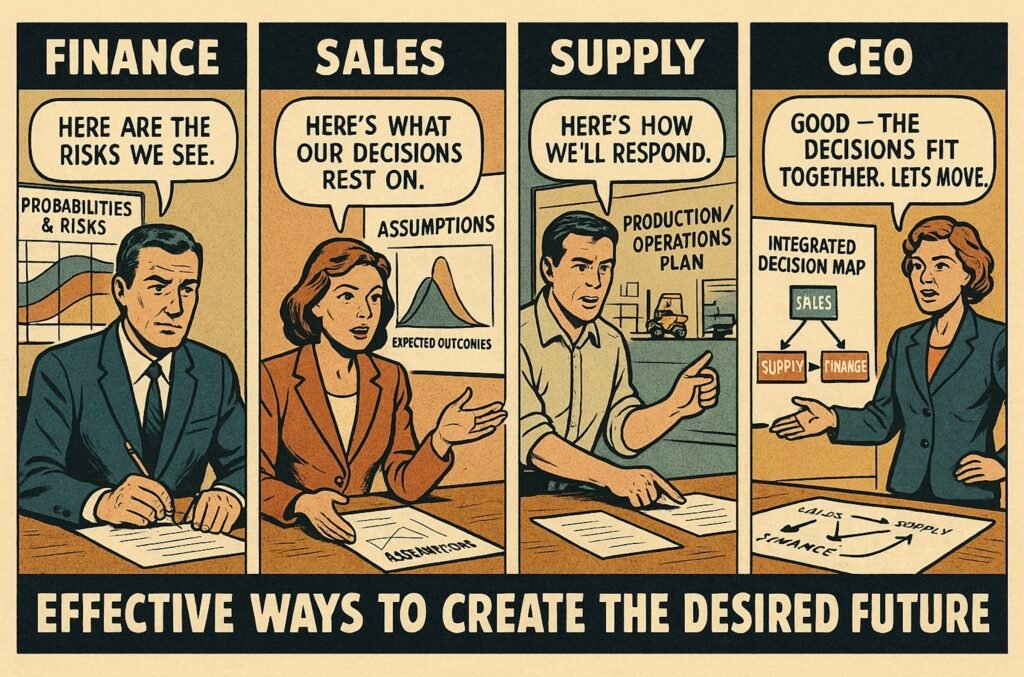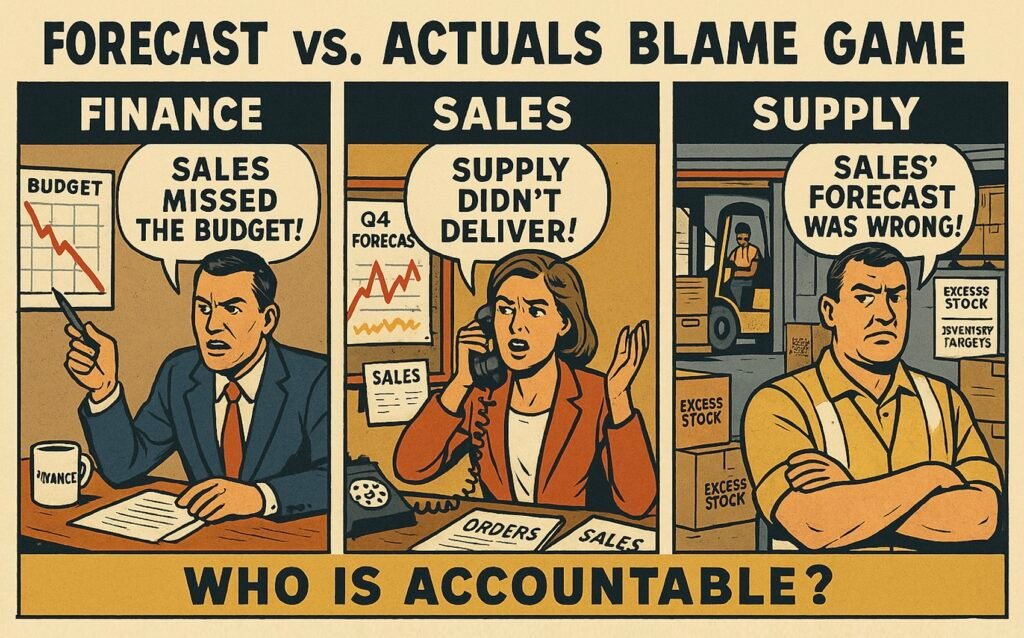Anyone who has ever had even a remote stake in any planning process has likely heard some version of this argument: “I don’t like planning; it’s a waste of time. The real results are made in execution.”
The advantage of this is that it sounds logical. It sounds simple and powerful. It makes you sound like a no-nonsense, get-things-done type of high performer who isn’t into theoretical fluff and ‘dreaming about the future.’
The disadvantage is that it’s also likely to lead to some really dumb decisions and decreasing revenues and profits. But what the h*ll, at least it sounds good, right?
It’s easy to forget two things: all major business decisions have long-term impacts and interdependencies with other decisions—including direct effects, trade-offs, risks, and opportunities—all of which are also influenced by luck.
If you are in an entry-level role in the organization—like stacking shelves in a warehouse—it’s a great idea not to waste time on planning (e.g., deciding where to place the next item or considering trivial and deterministic risks related to the task).
Very little of that is required in your job, and it is indeed less time spent on stacking the shelves and making progress, where your results are made.
However, many jobs in business are not ‘execution’ roles, where the work you do has little or no interdependencies with others, where impacts into the future are minor, and where the causality of business outcomes and your actions are both deterministic and clear.
All leadership roles are mostly about making and influencing decisions that result in somebody eventually stacking the shelves. And the higher the roles are in the organization, the more that applies.
Moreover, the bigger the business outcomes, the more they are subject to uncertainty, are influenced by luck, and the causality of actions is less clear.
Put differently, while the outcomes of some jobs, like stacking shelves in a warehouse, mostly depend on the ‘level of execution,’ outcomes of other jobs, like the CEO’s, depend more on the quality of her decisions and factors outside her control.
The practical implication is that while ‘focusing on execution’ is great advice for a warehouse worker, focusing on ‘improving the odds to win’ is much better advice for a CEO or anyone accountable for major business decisions. And that requires excelling in planning—not in how fast you can stack boxes.
Focusing on execution in roles that are not primarily about execution leads to a lack of understanding of decision interdependencies, risks, opportunities, trade-offs, or future impacts. This misunderstanding—along with overlooking the role of luck—results in flawed conclusions, poor decisions, hindered growth, and declining profits.
So, while there may indeed be a laser-sharp focus on ‘execution,’ the odds are that the entire organization is working very hard to excel at something that isn’t worth excelling in the first place. At the very least, it may be missing better opportunities that, in the long term, could prove critical—even existential.
The big misconception (a straw man argument, really) is that planning is ‘dreaming about the future,’ meaning thinking about what someone may or may not do at some point in the future, and what the outcomes—such as sales or margins—may or may not be, with little impact to what is decided here and now.
The root cause of this is poor planning skills, particularly mistaking the purpose of planning as creating a static plan that is then blindly followed no matter what happens.
This definition of planning is ingrained in finance professionals from their mothers’ breast milk, reinforced by silly planning practices like the annual budgeting process, or annual ‘strategic’ planning.
And yes, if that’s what’s meant by planning, then yes, that is indeed largely a waste of time and good to minimize. But that’s like saying, hey, I think it’s a good idea to minimize banging your head against the wall. I think that’s what makes it hurt so much. What a revelation!
Another common counterargument is to critique ‘endless planning,’ which is just another manifestation of the previous misconception about planning.
While it’s true that ‘endless planning’ is indeed useless, it’s the same as saying that drinking water is useless since drinking too much of it can kill you. Yet, not drinking water at all will also kill you. So what?
That’s simply stating the obvious: excess in anything is harmful. Not only is it unhelpful to point out, but it’s also misleading, as it implies the ‘practical’ solution is to avoid the activity altogether—which is absurd.
Over-exercising is counterproductive to being in great shape, but being in great shape requires strenuous exercise. Conversely, not exercising at all is harmful to your health and well-being. Sleeping all day prevents you from accomplishing anything, but not getting enough sleep diminishes your productivity, and no sleep at all can drive you crazy (literally).
Similarly, while ‘endless planning’ is harmful, neglecting planning is like being out of shape, sleep-deprived, and dehydrated. The key is to see planning as a tool for making better decisions. With this mindset, ‘thinking about the future’ is not about dreaming—it’s about determining what you are going to do right here and now.
It is simply the fact that by understanding the impacts and interdependencies, including the risks and opportunities that come with your decisions here and now, those decisions, in the long run and over time, will be far better than if you just focused on ‘stacking the shelves,’ as fast as possible.
In other words, planning improves the ‘odds to win.’
It’s not a black-and-white antagonism where execution or planning is ‘better’ or ‘worse.’ Arguing which is better is like arguing whether it’s better to be extremely fit person in a vegetative state with no brain activity, or paralyzed with full consciousness but unable to move any muscles.
The higher you are in the organization, the more the job is about decision-making, which requires planning, and the more those decisions have longer-lasting impacts with more interdependencies.

That’s also why higher roles require ‘strategic thinking,’ while lower levels do not. Strategic thinking involves considering holistic consequences under ambiguity and uncertainty rather than narrowly focusing on immediate deterministic tasks, like ‘stacking the shelves.’
So, if you think planning is a waste of time, you are right if you are in a low-level role in the organization, with little power to make decisions that have long-lasting, wide impacts, and are subject to high uncertainty.
However, if you are accountable for major business decisions and the work of others and think planning is a waste of time, odds are you’re either incompetent to be in your role, or at the very least ‘leaving money on the table,’ for no good reason.
Well, no other reason than being focused on execution does sounds good and who wouldn’t want to be seen as get-things-done type of high performer. Even if it would cost the company millions.
Practical insights
- Planning and execution are not trade-offs.
- Many business roles are not ‘execution’ roles.
- The benefits of planning depend on the types of decisions you make.
- Neglecting planning will likely cost millions.
- Focusing on execution is great advice for a warehouse worker, but not for a CEO.




